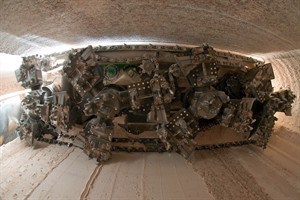
The cutting face of a potash borer is shown in a deep shaft at the Rocanville potash mine, owed by the PotashCorp of Saskatchewan, in Rocanville, Sask., in this 2007 photo. THE CANADIAN PRESS/Troy Fleece
July 26, 2012 - 6:19 AM
SASKATOON - Potash Corp. of Saskatchewan Inc. (TSX:POT) reports second-quarter earnings $522 million,or 60 cents per share, down from $840 million, or 96 cents per share in the same period last year.
The company says while the results reflect strong underlying performance, earnings were impacted by a $341 million impairment recorded on our investment in Sinofert Holdings Litd.
Greater potash demand, including unprecedented offshore sales, resulted in gross margin of $1.2 billion for the quarter, the third-best quarterly total in company history.
Gross margin for the first six months of 2012 reached $1.9 billion, which trailed the $2.3 billion generated in first-half 2011.
Analysts polled by Thomson Reuters were on average expecting earnings per share of 99 cents and revenues of more than $2.5 billion.
Saskatoon-based Potash is the world's largest fertilizer company by capacity and Saskatchewan has the world's largest deposits of potash, a valuable mineral mainly used in fertilizer.
An ongoing drought that's been ravaging the U.S. Midwest this summer has raised questions about future demand for fertilizer. Potash and phosphates tend to linger in the soil if plants don't soak them up, so farmers may not wind up needing to buy more crop nutrients when they plant their fields in the spring.
But the company says it believes farm production shortfalls expected this year will support an extended period of crop prices at levels that encourage high-yield agriculture. This in turn will encourage rising demand for the company's products, specifically potash, in the years ahead.
In 2010, Potash was the target of a hostile US$40-billion takeover bid by Ango-Australian mining giant BHP Billiton.
The takeover battle became a major political flashpoint in Ottawa, and in the company's home province of Saskatchewan. Premier Brad Wall was an outspoken critic of the bid.
In the end, the federal government rejected the offer on the grounds it did not provide a net-benefit to Canada.
News from © The Canadian Press, 2012